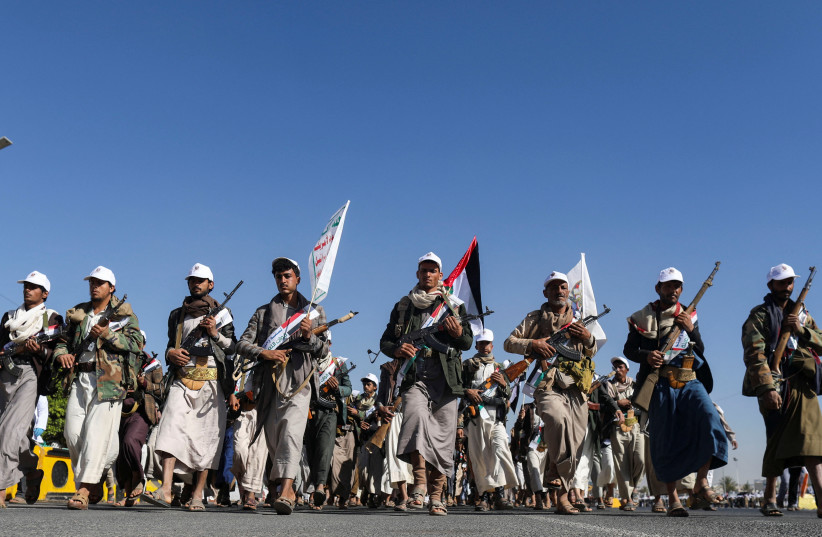More countries are beginning to realize the threat the Iran-backed Houthis pose to the Middle East and to the global economy. For two months, the Houthis have been increasing threats to shipping. So far, they have had almost total impunity.
But things are beginning to change. In mid-December, the US helped create Operation Prosperity Guardian, a joint maritime security initiative. The global shipping giant Maersk, however, has once again paused shipping via the Red Sea after a recent attack on one of its ships. This shows that to create havoc, the Houthis only have to pose a credible threat.
US Central Command has been spotlighting the Houthi threats. Now, the US has said more countries are willing to speak with one voice against the threats. On January 3, the White House released a joint statement by the United States, Australia, Bahrain, Belgium, Canada, Denmark, Germany, Italy, Japan, the Netherlands, New Zealand, Singapore, and the United Kingdom.
The statement said 44 countries have a broad consensus on the threats in the Red Sea. The UN has also condemned the attacks.
“Ongoing Houthi attacks in the Red Sea are illegal, unacceptable, and profoundly destabilizing,” the statement said.
“There is no lawful justification for intentionally targeting civilian shipping and naval vessels. Attacks on vessels, including commercial vessels, using unmanned aerial vehicles, small boats, and missiles, including the first use of anti-ship ballistic missiles against such vessels, are a direct threat to the freedom of navigation that serves as the bedrock of global trade in one of the world’s most critical waterways.”

What comes next in the Red Sea?
The attacks threaten innocent lives, it said, adding that “nearly 15 percent of global seaborne trade passes through the Red Sea, including 8 percent of global grain trade, 12 percent of seaborne-traded oil and 8 percent of the world’s liquefied natural gas trade.”
Now, the countries say they “call for the immediate end of these illegal attacks and release of unlawfully detained vessels and crews,” the statement said. “The Houthis will bear the responsibility of the consequences should they continue to threaten lives, the global economy, and free flow of commerce in the region’s critical waterways. We remain committed to the international rules-based order and are determined to hold malign actors accountable for unlawful seizures and attacks.”
Russia also said it was seriously concerned about the situation in the Red Sea. The Russians, however, put the blame on the war in Gaza, Russian Permanent Representative to the United Nations Vasily Nebenzya said. This appears to excuse the attacks.
“I think that hardly anyone of our counterparts will deny the fact that developments in the Red Sea are the direct projection of violence in Gaza, where the cruel operation of Israel continues already for three months,” a Russian diplomat told the UN Security Council.
Hamas attacked Israel on October 7. Israel defended itself. The Iran-backed Houthis chose to illegally attack shipping. It appears, however, that Russia is blaming Israel for the attacks.
This leaves questions about what may come next in the Red Sea. Will countries be willing to actually act against the Houthis, or will the Houthis continue to decide on a time and place to attack ships?
If most companies refrain from shipping, all the Houthis have to do is wait for any ship to pass and launch a few missiles; they can then once again claim to have won by interdicting international trade. This shows how Iranian-backed proxies can choose where to attack and rarely suffer repercussions.
In fact, it appears that bad actors such as Iran and Hamas are successfully able to leverage some other countries that want to exploit these issues for their own reasons to get back at the West. As such, countries that likely would have condemned these attacks several years ago, including Russia, are now inclined to blame Israel’s operations in Gaza.
